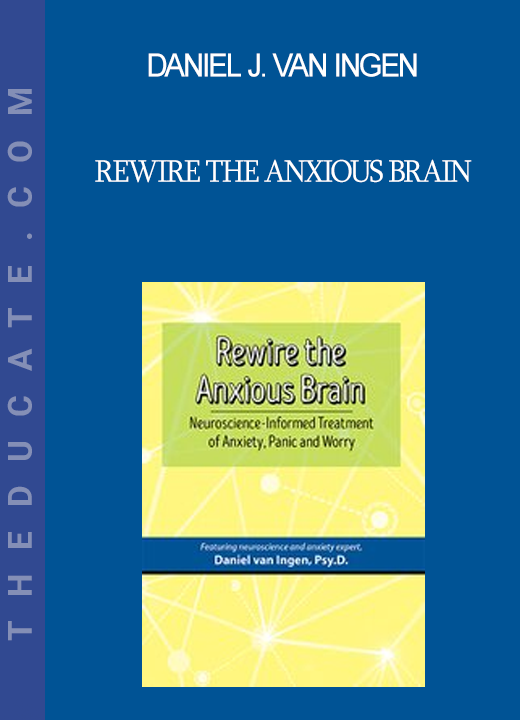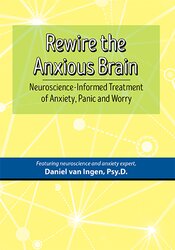Description
Daniel J. van Ingen – Rewire the Anxious Brain: Neuroscience-Informed Treatment of Anxiety, Panic and Worry
- Faculty:
- Daniel J. van Ingen
- Duration:
- 6 Hours 47 Minutes
- Format:
- Audio and Video
- Copyright:
- May 06, 2020
Description
Join neuroscience and anxiety expert, Dr. Daniel van Ingen in this recording and learn his keys for successful anxiety treatment. Dr. van Ingen integrates brain-based strategies for calming the anxious mind with client communication techniques that motivate change in your clients. Daniel’s approach promotes adherence to treatment and strengthens the therapeutic alliance – which is essential when working with anxious, worried, traumatized, or obsessive clients.
Dr. van Ingen will give you proven tools and techniques to:
- Identify and treat the roots of anxiety in both the amygdala and the cortex
- Explain “the language of the amygdala” in an accessible, straight forward way
- Identify how the cortex contributes to anxiety, and empower clients with strategies to resist anxiety-igniting cognitions
Purchase this transformational recording today and put the power of neuroplasticity to work for you and your anxious clients!
Handouts
| Manual – Rewire the Anxious Brain (5.2 MB) | 125 Pages | Available after Purchase |
| Illinois Educators Self-study Instructions (28.5 KB) | Available after Purchase | |
| Illinois Educators Evaluation Form (1.2 MB) | Available after Purchase |
Outline
Use Neuroscience in the Treatment of Anxiety
- Positives: We know more about anxiety-based disorders than any other disorders
- Science gives explanations, evidence, authority, destigmatizes difficulties
- Concerns: It can be difficult to explain, answer questions
- Clients may feel a lack of responsibility
- Oversimplification is inevitable
Enhancing Engagement in Treatment
- Don’t neglect the therapeutic relationship!
- Address the challenges of anxious clients
- Remember that strategies are effortful
- Guide the process using client’s goals
- Maintain motivation
Neuroplasticity
- Define Neuroplasticity in everyday language
- Therapy is about creating a new self
- ”Rewiring” as an accessible concept for change
- Re-consolidation: the modification of emotional memories
Identify Two Neural Pathways to Anxiety
- Amygdala – bottom-up triggering of emotion, physicality of anxiety
- Cortex – top-down emotion generation based in cognition
- Explain the two pathways to clients
- How anxiety is initiated in each pathway and how pathways influence each other
Client Friendly Explanations
- Use illustrations to create concrete understanding
- Fight/flight/freeze responses
- The “language of the amygdala”
- Anxiety and the cortex
- Help clients recognize the two pathways to anxiety
Neuroplasticity in the Amygdala (Essential for all Anxiety Disorders, PTSD, OCD, Depression)
- Sleep and the amygdala
- The influence of anxiety
- Breathing techniques to reduce activation
- Relaxation, meditation, and yoga to modify responses
- Exposure as opportunities for the amygdala to learn
- Combatting avoidance
- When anxiety indicates that the amygdala can learn new responses
- Push through anxiety to change the amygdala
Neuroplasticity in the Cortex (Essential for GAD, SAD, OCD, PTSD, Depression)
- ”Survival of the busiest” principle – strengthen or weaken specific circuitry
- The healthy (adaptive) use of worry in the cortex
- ”You can’t erase: You must replace”
- Recognize and modify the impact of uncertainty
- Training correct uses of distraction
- Left hemisphere techniques – cognitive defusion, coping thoughts, fighting anticipation
- Right hemisphere techniques – imagery, music
- Mindfulness and anxiety resistances
Neuroplasticity and Medications for Anxiety Disorders, OCD, PTSD, Depression
- Medication’s effects in the rewiring process
- The myth of the chemical imbalance
- The danger of sedating the brain with benzodiazepines
- Promoting neuroplasticity with SSRIs, SNRIs
- The effectiveness of CBT and meds
Move Beyond Diagnostic Categories to Focus on Anxiety Pathways
- Anxiety is a component of many diagnoses (depression, substance abuse, etc.)
- Amygdala- and cortex-based techniques help in other disorders
- Targeting brain-based symptoms rather than disorders
- Worry, obsessions, rumination respond to similar cortex-based techniques
- Panic, phobic responses, and compulsions respond to amygdala-based techniques
Research, Risks and Limitations
- Empirical versus clinical and anecdotal evidence
- Clinical considerations for specific clients and settings
- Efficacy of particular interventions may vary
Faculty

Daniel J. van Ingen, Psy.D. Related seminars and products: 2
Licensed Psychologist
The IMA Group
Daniel van Ingen, Psy.D., is passionate about the treatment of anxiety and believes that his strategy of anxiety tolerance training requires non-medication treatment strategies. He has developed easy-to-understand explanations and techniques that quickly fuel the road to recovery.
A licensed clinical psychologist in Florida, Dr. van Ingen maintains a private practice that specializes in anxiety treatment called Anxiety Shrinks! Prior to private practice, he worked at a VA hospital, colleges, a drug treatment program, and outpatient clinics.
Dr. van Ingen, trained as a scholar-practitioner, has many empirical studies published on cognitive behavioral therapy for anxiety disorders, parenting research, and disabilities. He has presented at national and international conferences for over 15 years and has trained providers in 30 states over 5 years. His book, Anxiety Disorders Made Simple: Treatment Approaches to Overcoming Fear and Building Resiliency, (PESI, 2014), has received outstanding reviews from psychologists, psychiatrists, and social workers alike. He has been dubbed the Sarasota Parenting Doctor in his private practice work with families.
Dr. van Ingen blogs anxiety articles and posts weekly parenting podcasts on his “Parenting Doctors Podcast” on iTunes.
Speaker Disclosures:
Financial: Daniel van Ingen maintains a private practice. He receives a speaking honorarium from PESI, Inc.
Non-financial: Daniel van Ingen has no relevant non-financial relationship to disclose.









Reviews
There are no reviews yet.